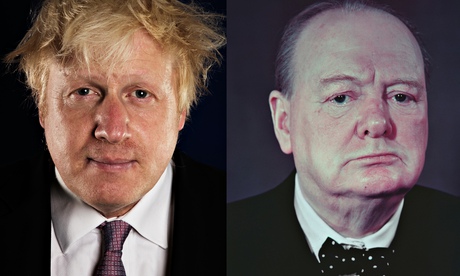
This year’s crop of biographies is highly coloured and weighty, but in heft more than gravity. There’s no evidence here of the hard times that publishers complain about.
Boris Johnson’s The Churchill Factor (Hodder £25) could be subtitled “The Boris Factor”. It’s a Christmas cracker, calculated to plant in the minds of the electorate the improbable idea that London’s mayor could inherit Churchill’s mantle. In one of many entertaining asides, Johnson launches into a barmy meditation on the comparative heights of great leaders: Churchill was said to have been about 5ft 6in. “Who else was 5 foot 6 or under?” muses the mayor. “Some of the biggest tyrants and creeps in world history. Augustus (5 foot 6), Mussolini (ditto), Stalin (teensy at 5 foot 4). And Hitler was only 5 foot 8.” This, declares Johnson, is “sometimes referred to as ‘short man syndrome’”. Does it explain his subject’s behaviour? We’re a long way from Martin Gilbert or Roy Jenkins, two distinguished Churchill biographers.
WS Churchill gets just one index reference in AN Wilson’s sparkling new life of the great queen-empress, Victoria: A Life (Atlantic £25). Wilson has already seduced many readers with his acclaimed study of the Victorians; here he bewitches them with a characteristically brilliant life-and-times. His Victoria is short in stature, but “fascinating and self-contradictory”, an addicted journal- and letter-writer. Following Disraeli, Wilson falls for her charms. This will be a must-read in many English households during the Christmas hibernation.
Napoleon was 5ft 6in. According to Andrew Roberts, Napoleon the Great (Allen Lane £30) was neither creep nor tyrant, but “one of the most extraordinary men who ever lived”. At 936 pages, Roberts’s “Boney” contains some fascinating material, based on thousands of new documents. The drama of 1812, Waterloo and Napoleon’s exile can rarely have been told so persuasively by an unabashed Bonapartist.
Not every headstrong adventurer becomes a revolutionary, though many dream about it. The Red Earl (Bloomsbury £18.99) is Selina Hastings’s exhilarating homage to her father, the 16th earl of Huntingdon. He was an aristocrat who conducted a one-man revolt by running off to the South Pacific with a beautiful Italian woman. After an interlude in Hollywood, he settled down with Diego Rivera, the great Mexican artist, and his wife, Frida Kahlo. By the standards of Hastings’s previous biographies (Nancy Mitford, Waugh and Maugham), this is impressionistic and soft-centred, a sketch not an oil. Her portrait of the “invisible man” who knew everyone from Stafford Cripps to Charlie Chaplin makes for a perfect stocking-filler. It’s a life with “soon to be a major motion picture” written all over it.
So, too, is the life Vita Sackville-West, the subject of Behind the Mask by Matthew Dennison (Collins £25). This new biography of a great gardener, Observer columnist, passionate homosexual and literary celebrity, explores the public career and hidden drives of another interwar renegade. Dennison is a seasoned biographer who explores a “brave and charismatic woman” he believes to have been “misunderstood”.
For Michael Smith, his Shackleton (Oneworld £20) describes another “extraordinary character”, the explorer who pioneered the mapping of Antarctica. Born in the same year as Churchill, 1874, this hard-driving Irishman had a similarly unpromising childhood, but came into his own as an Edwardian hero. Raised on the novels of Rider Haggard and the poetry of Robert Browning, he was “hungry for adventure and fame” but became eclipsed in the public mind by the tragic figure of Captain Scott. His finest hour was a triumph snatched from the jaws of disaster on his next expedition. His vessel, Endurance, became trapped in the ice. The only way out was “the worst journey in the world”. The voyage of the James Caird, to the comparative safety of South Georgia, became an epic of late-empire stoicism. “I know nothing about sailing,” joked Shackleton as he embarked in his fragile boat.
Václav Havel would have relished such a moment. In Michael Zantovsky’s deeply sympathetic life, Havel (Atlantic £25), he comes across as a profound ironist: a humane, self-deprecating, determined nonconformist whose crucial role in the Velvet Revolution was to extricate his people from the grip of Soviet communism and sponsor the conditions in which a modern Czech republic could be born. Zantovsky says that, as Havel’s press secretary and spokesman, he “probably spent more time with the new Czech president than any other person, including his wife”. The upshot is an enthralling, sometimes thrilling, portrait of an infinitely varied character, a man of deep contradictions nurtured by equally deep convictions. In short, a modern great. This must be the biography of the year.

